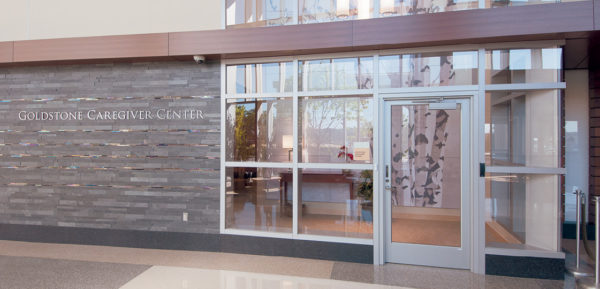It is well understood by anyone who has spent time with a loved one the hallways and waiting rooms of a medical facility can be inhospitable places to manage the burden of being a caregiver.
Recognizing the need for rest and distraction from the emotional and physical stress of being a caregiver, Danbury Hospital recently opened the Goldstone Caregiver Center, a space where family, friends, community members and even hospital staff can find relief.
“It is the first of its kind in Connecticut,” Andrea Rynn, director of public and government relations for the hospital, said.  “Everything in here was designed to be calming and serene.”
Officially opened Sept. 17, the new facility was made possible through a $1 million gift from Liz and Steven Goldstone of Ridgefield. A nutritionist and former critical care nurse, Liz and her husband are longtime donors to the hospital with a specific focus on initiatives promoting patient-centered care.
The new center features private rooms, lounge areas and stocked kitchenettes as well as a workstation with Internet and phone access.
The new facilities amenities amount to a “home away from home,” as one visitor wrote in the center”™s guest book.
Beyond the physical features, the center offers on-site support from professionals like Miranda Dold, LCSW, a licensed clinical social worker and manager of the center, and center Director Lynn Crager, RN, MSN, a chaplain who also serves as the director of the hospital”™s department of spiritual care.

- Danbury Hospital”™s new Goldstone Caregiver Center is dedicated to providing a distinctly different environment from the rest of the hospital for family, friends and staff to find relief from stress of giving care. Photo courtesy Goldstone Caregiver Center
“Oftentimes, caregivers are solely focused on the needs of the person they”™re caring for,” Dold said. “Every individual defines support differently. For some, it”™s enjoying a cup of coffee in a quiet room to gather his or her thoughts. For others, it”™s speaking with a licensed mental health professional about the myriad of emotions they”™re experiencing and hiding from family members in an effort to ”˜be strong.”™ We tell caregivers that by caring for themselves they”™ll be better able to care for their loved ones.”
In addition to professional staff, trained volunteers known as “caregiver coaches” provide support inside and outside of the center as part of the hospital”™s outreach to caregivers who do not come into the center, but may still need support.
“We have had family members who haven”™t eaten all day and won”™t leave the bedside,” Dold said. “We have come down to our kitchen, packed up some light snacks and beverages and brought it to them at the bedside and say ”˜you have to take care of yourself, this is for you.”™”
The center also provides lectures, workshops and resources for caregivers to connect and share resources with one another as well receive information specifically focused on managing certain conditions such as Alzheimer”™s or dementia.
“Caregiving is a rewarding but very challenging experience. Caregivers very often don”™t take care of themselves,” Crager said. “Caregivers give up their lives to care for someone else, whether it”™s a spouse, child, sibling, elderly parent or another person who is important in their life. It can be very isolating to be a caregiver.”
The center is meant to provide caregivers an opportunity to try and break down the isolation of the caregiving experience, particularly through support groups, Dold said.
With one caregiver referring to the the new facility as a “port in the storm,” the center has thus far gained a warm reception from the friends and family of patients at the hospital as well as staff, Dold said.
“Whether it is to be able to work remotely or just get on social media for a few minutes, it is a way to not think about all they are going through,” she said. “When people walk through the door, you can almost see the stress melt off. It is not like it takes the stress away, it can”™t take away the difficulties of what they are going through in caring for others.”















